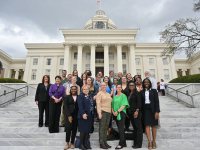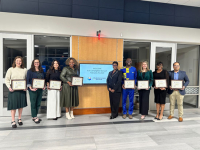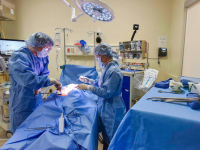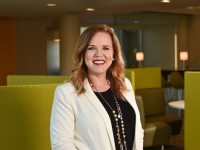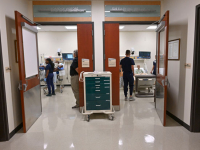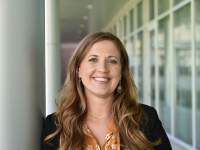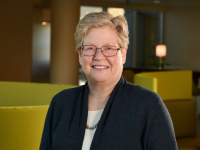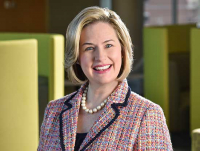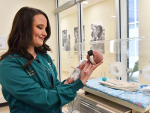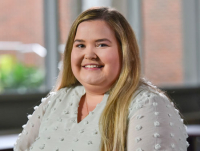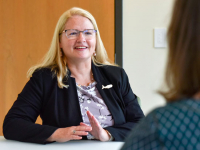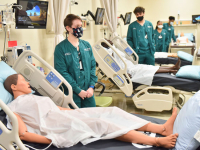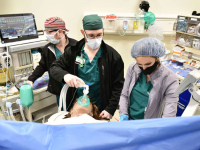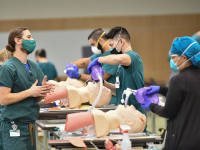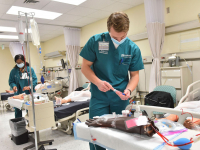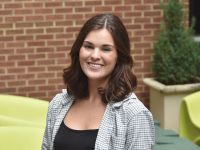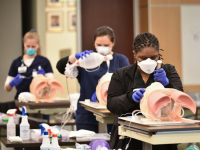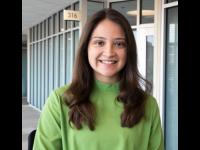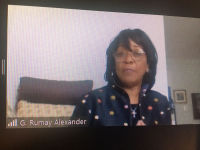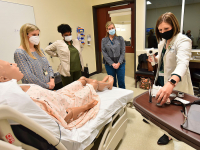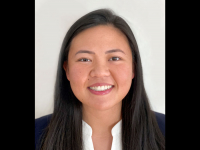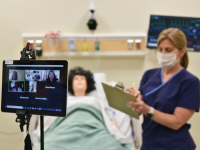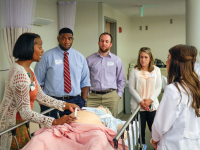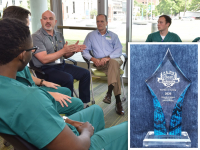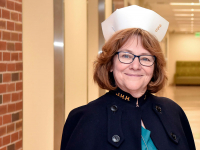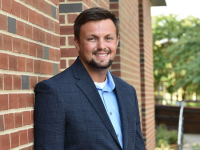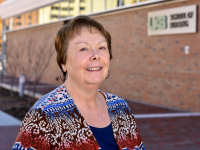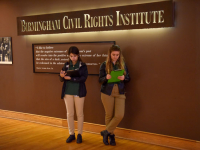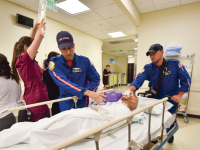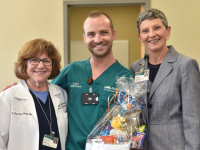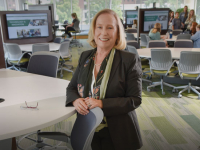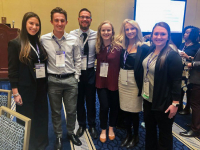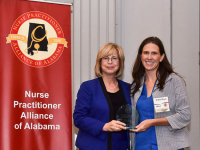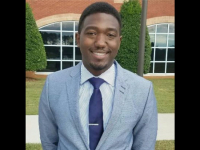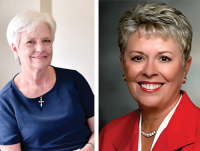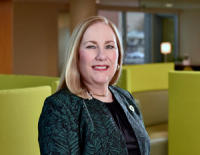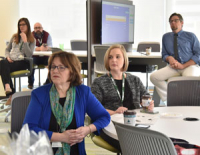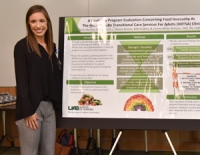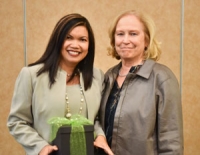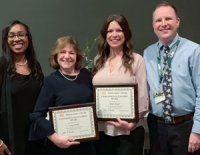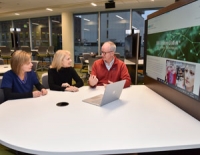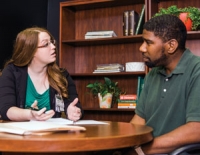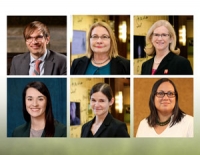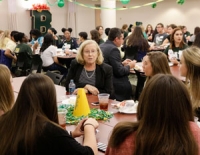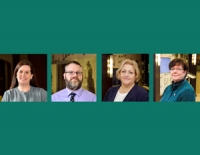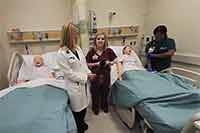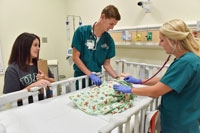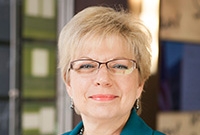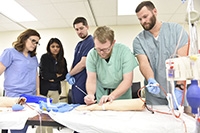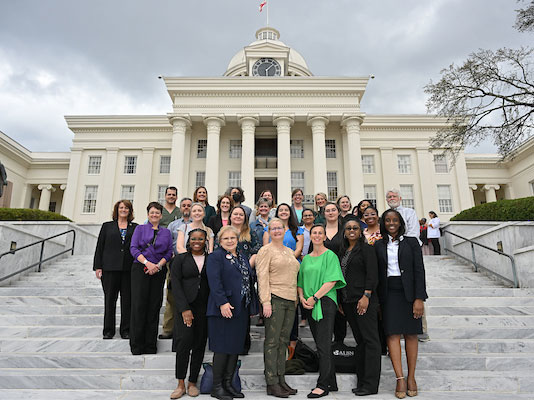
By Frank Couch
A contingent of students and faculty from the University of Alabama at Birmingham School of Nursing joined nurses from across Alabama in Montgomery for the annual Nurses Day at the Capitol organized by the Alabama Coalition of Nursing Organizations.
The event gave the group an opportunity to meet with state representatives, observe committee meetings and see in person the legislative process, learning how to advocate for issues that impact nursing practice and patient care.
Co-Director of the School’s Leadership and Health Policy Initiative, Professor and Director of Health Policy Partnerships Joy Deupree, PhD, MSN, RN, WHNP-BC, FAAN (BSN 1994, MSN 1997), said Nurses Day at the Capitol is an exceptional educational experience in health policy and government. She said the day was the first time many of the students had visited the Capitol and she took the opportunity to demonstrate relationship building with legislators.
“Initially students seemed a bit intimidated and as the day progressed, they became more confident introducing themselves in the hallways and offices of the State House,” Deupree said.
Deupree traveled to Montgomery with the School’s inaugural class of Health Policy Fellows, mid-to senior-level faculty who are spending the year engaged in didactic and experiential learning developing a deep understanding of policy, advocacy and communication techniques, as well as negotiation skills.
“I think they saw firsthand the importance of teaching policy advocacy, especially early in nursing education. The Fellows are learning to foster collaborative and innovative relationships to drive policy change leading to improved patient outcomes,” Deupree said. “They also are working on an advocacy project to demonstrate understanding of the advocacy and policymaking process. At the end of their year, they will understand how to use the platform inherent to the profession to help create change. Their experience at Nurses Day at the Capitol is part of their fellowship education.”
Deupree said the Fellows shared their areas of expertise and research with legislators.
“As part of the relationship building process it is important for legislators, especially those from rural areas, to hear from their constituents,” Depuree said. “When it comes to health policy, offering their expertise in areas of health care and improving patient outcomes, Fellows can strengthen those ties.”
The Health Policy Fellows were joined by a number of other UAB School of Nursing faculty and students. Instructor and Director of the Graduate Nursing Education Primary Care Scholars Melanie Baucom, DNP, CRNP, FNP-BC (BSN 2009, MSN 2010, DNP 2019), attended Nurses Day at the Capitol for the second consecutive year. She brought with her some of the School’s Primary Care Scholars, nurse practitioner students who are dedicated to providing care in rural communities.
“Health care for patients from rural and underserved communities can be more heavily affected by policy decisions due to the increased vulnerability associated with those communities” Baucom said. “Applying a health equity lens to state level policy decisions, scholars can work with legislators to help mitigate negative social determinants of health, which in turn can improve health outcomes for vulnerable communities across the state.“
Professor and Associate Dean for Graduate Clinical Education Aimee Holland, DNP, CRNP, WHNP-BC, FAANP, FAAN (DNP 2012), led a group of Advanced Nursing Education Workforce Fellows, funded by a grant from the Health Resources and Services Administration. These Fellows are advanced practice nursing students in either the nurse-midwifery track or a primary care nurse practitioner specialty track who want to care for rural and underserved populations when they graduate.
“This experiential learning opportunity provided students a way to put into practice the advocacy skills we taught them this semester to advocate for health policy as part of their training with the ANEW grant,” Holland said.
After students and faculty attended committee meetings and walked the hallways of the Statehouse introducing themselves to their respective representatives and senators, they met on the marble steps to hear from fellow nurses and organizations that have pledged to improve nursing practices throughout the state.
Health Policy Fellow and Associate Professor, Melanie Hallman, DNP, CRNP, CNS, FAEN, FAANP, FAAN (BSN 1983, MSN 1990, MSN 1995, DNP 2012), said the day expanded her view of tangible ways she can make a difference in the future of nursing and in health care outcomes.
“We can influence positive outcomes for patients and their communities on a much greater scale by making a commitment to be an active part of health care policy advocacy, and by influencing our current and future colleagues to do the same,” Hallman said.









